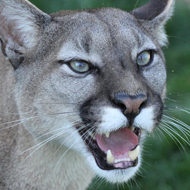
Park restrictions impact on animals but fail to stop illegal activity study finds
Security barriers in national parks on the US/ Mexican border are having a bigger impact on the restriction of movement of native species, such as pumas and coati, than they are on humans, research has found.
National parks in their vicinity can be vulnerable to the smuggling of people and drugs.
Barriers have been put up to counter illegal activity. But they are restricting the territory of native species according to new research from the University of Bristol.
Bristol PhD student, Jamie McCallum, now of the Zoological Society of London (ZSL), and colleagues from Bristol's School of Biological Sciences and ZSL investigated the impacts of illegal activity and the barriers themselves.
They used automatically triggered cameras (camera traps) to measure the number of humans, native and invasive mammals in four US parks on the Mexican international boundary.
Comparisons were made between areas with barriers and those without. Puma and coati were detected more often in areas without barriers, whereas counts of humans were seemingly unaffected.
The findings have been published in an article 'Conservation on international boundaries: the impact of security barriers on selected terrestrial mammals in four protected areas in Arizona, USA' in PLoS ONE
Image by Danny Nicholson



 The Veterinary Medicines Directorate (VMD) is inviting applications from veterinary students to attend a one-week extramural studies (EMS) placement in July 2026.
The Veterinary Medicines Directorate (VMD) is inviting applications from veterinary students to attend a one-week extramural studies (EMS) placement in July 2026.